You may have thought all of your weight loss problems would be solved when you had gastric bypass surgery, but it’s not uncommon for some people to regain some of the weight they lost after surgery. You were probably highly motivated to stick to your diet and exercise regimen following your surgery. Over time, you might have fallen back into some old behaviors, or you may have gotten a little lax with your exercise.
Don’t worry! There are some things you can do to get back on track. If your weight loss has stalled or you’ve regained some weight, keep reading to learn what you can do about it.
Gastric Bypass
Gastric bypass surgery, also known as the Roux-en-Y gastric bypass is considered the gold standard of weight loss surgery and is one of the most commonly performed bariatric procedures. During the procedure, the surgeon creates a small pouch from the stomach and connects the newly created pouch directly to the small intestine.
After gastric bypass, your food is digested differently. It travels down into the pouch of the stomach and then directly into the small intestine, thereby bypassing most of your stomach and the first part of your small intestine.
Your doctor may recommend gastric bypass to treat morbid obesity when weight loss has been unsuccessful with diet and exercise, or when you have serious health problems that are a consequence of your weight.
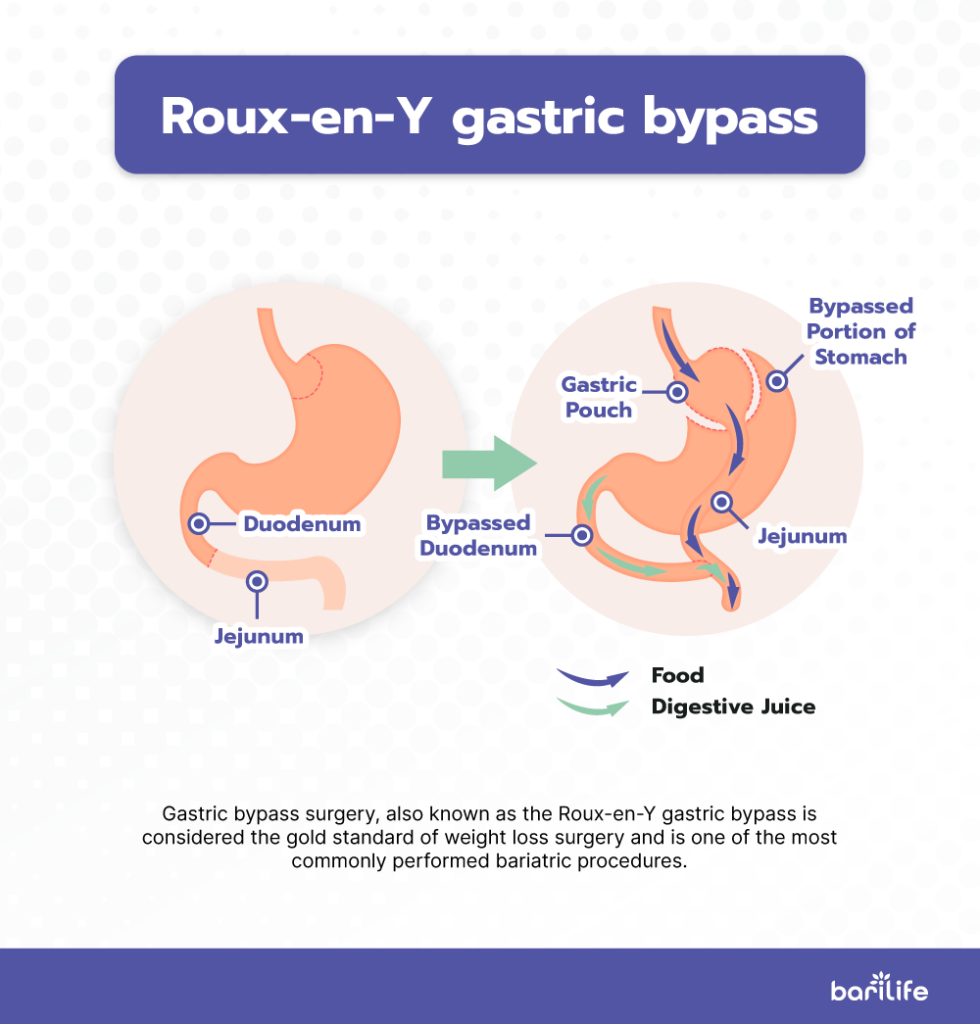
How much weight should you lose?
You might be wondering how much weight you should have lost following gastric bypass, and how much weight you need to lose now after regaining.
Bariatric medicine often uses the term Excess Weight Loss (EWL). You can calculate your EWL by taking your pre-surgery weight and subtracting your “ideal body weight.” EWL provides context to the connection between your pre-surgery weight and “ideal weight.”
The average weight loss after gastric bypass surgery is about 70 percent of excess body weight within 18 months.
[CALCULATOR SHORT CODE]
About one month following your gastric bypass surgery, you can expect to lose approximately 17 percent of your excess body weight. At around 3 months, most people have lost about 25-35% of their excess body weight. The goal for most people is a weight loss of about 45-55% by the 6-month mark. If you are consistent with your diet and physical activity, you should lose around 60-70% of your excess body weight after about 12 months.
This is only an average based on research data, so your results may vary. Your surgeon can help you determine what weight loss goals are appropriate for you.
Why is weight regained after gastric bypass?
People are more highly motivated right after surgery, so it’s easier for them to adhere to diet and exercise recommendations. The period following surgery is often referred to as the “honeymoon” phase. You probably found it easier to follow the low-carb, low-calorie diet and the weekly 150 minutes of moderate-intensity exercise that was recommended by your doctor.
As time passed after surgery, you may have gotten comfortable in your newfound weight loss and reverted back to old habits. Your diet likely became more lenient and your daily movement decreased. At first, your weight loss slowed, but now it’s started to climb.
Many people who undergo gastric bypass regain some or most of their weight lost back within 10 years. One recent long-term study showed that 93% of patients who received gastric bypass surgery maintained at least a 10 percent weight loss from their pre-surgery weight. Seventy percent maintained at least a 20 percent weight loss, and only 40 percent maintained at least a 30 percent weight loss after 12 years.
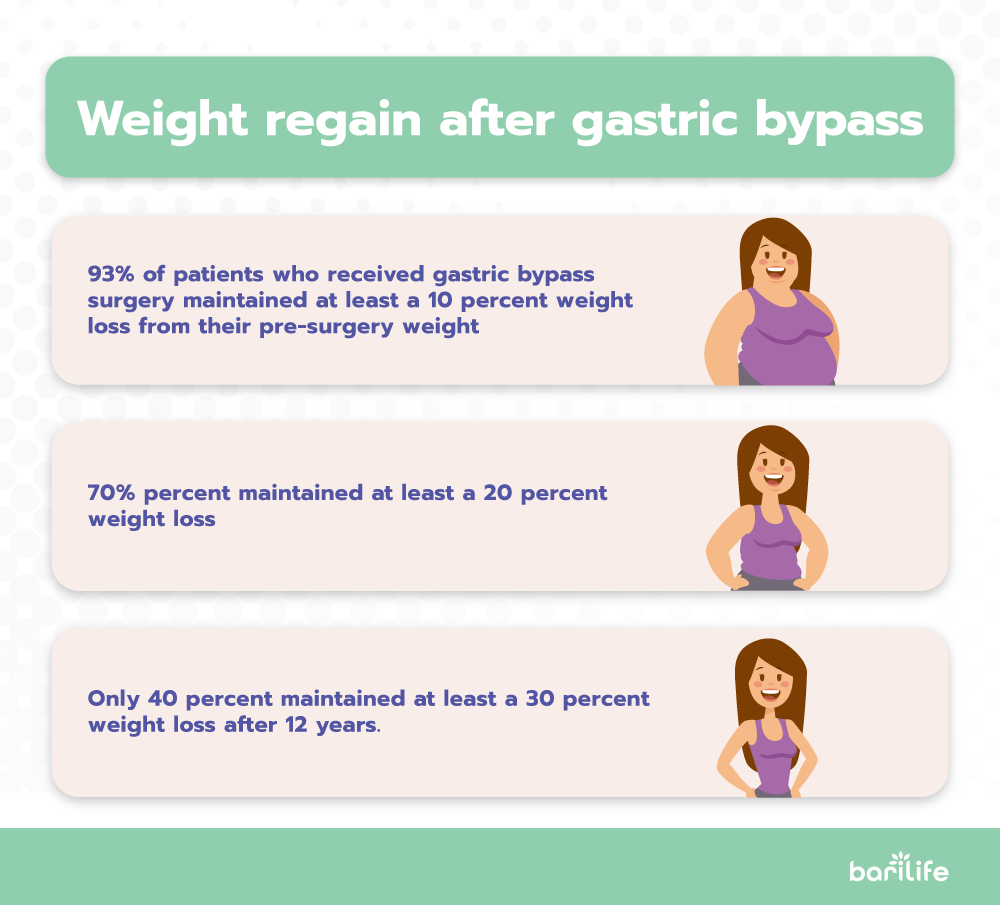
There are a variety of reasons why you may have gained weight after gastric bypass, but most of them come down to your daily habits. Mose people can restart their weight loss by modifying lifestyle behaviors. Poor mental health, diet, exercise, hormone or metabolic imbalance, and pouch dilation are all factors that might promote weight regain.
Adopting healthy eating and exercise habits early on is highly recommended for anyone who is considering bariatric surgery. Maintaining these habits for life is necessary for keeping the excess weight off long-term.
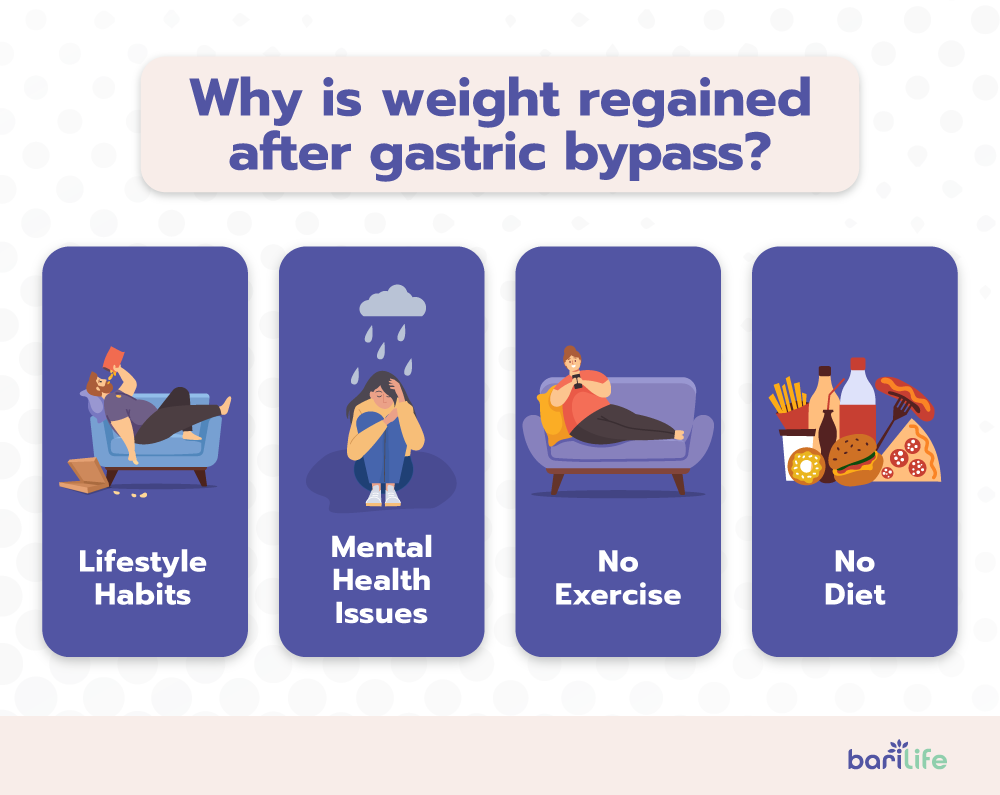
How to prevent weight gain after gastric bypass
It’s much easier to keep the weight off if you’re maintaining a proper diet and exercising regularly. While many people who have gastric bypass surgery gain some of their weight back, there are some steps you can take to prevent it. To prevent weight regain:
- Schedule regular follow-ups with your surgeon to keep weight loss on track with your goals.
- Eat a moderate-calorie diet that is high in lean proteins, and limit carbohydrate and fat intake.
- Keep your portions in check.
- Try not to snack or graze throughout the day. This can interfere with regular hunger and fullness cues and lead to excess calorie intake.
- Regularly do 150 minutes of moderate-intensity exercise per week. This should be a combination of cardio and resistance training.
- Seek a bariatric surgery support group if you’re having difficulty sticking with the recommended lifestyle changes.
- Seek additional help from your bariatric surgeon and dietitian for support. They want you to be successful in maintaining your weight loss long-term. There is nothing to embarrassed about if you regain some weight. Obesity is a chronic, multi-faceted condition that conditions your body for weight gain.
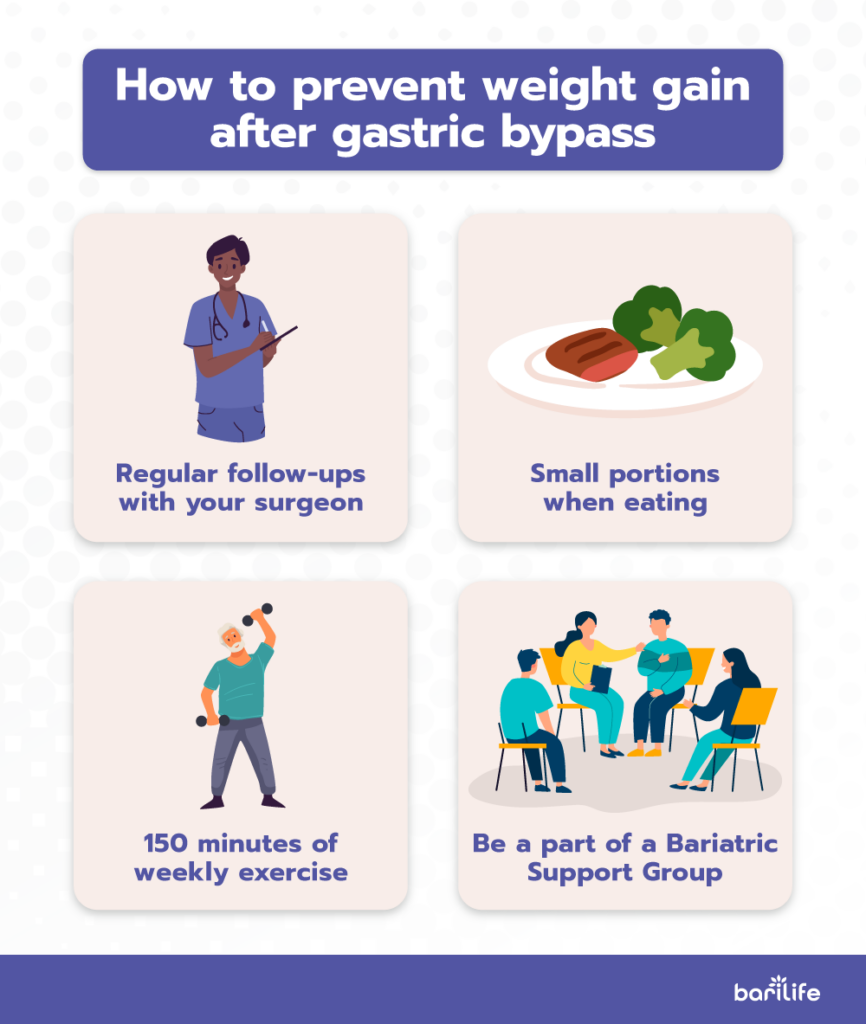
Adverse effects of weight regain
Gastric bypass surgery often results in improvements in comorbid diseases like diabetes, hypertension, and high cholesterol.
Unfortunately, when weight is regained, it can have negative effects on your overall health. Weight regain may result in:
- The return of comorbid diseases
- Decreased quality of life and mental health issues
Even if you had improvements in your blood pressure and blood work after gastric bypass, if weight it regained, it can often cause them to return to abnormal levels. It is important to have regular check-ups with your doctor if significant weight regain has occurred.
Weight regain may also negatively affect your quality of life. Studies show that weight regains of about 15% or more resulted in a quality of life that was similar to the quality of life of obese people that did not have any surgical intervention.
There is no need to beat yourself up if you regain some of the weight you lost. You just have to get back to the lifestyle changes you made after surgery. This can jumpstart weight loss and get you going again. Here’s how to restart weight loss after weight regain:
- Be honest with yourself about your eating habits. Have you been eating larger portions? Have you been eating out more often? Are you grazing throughout the day or binging?
- Start tracking the foods you eat (caloric beverages, too!), so you know just how many calories you have been consuming.
- Decrease your calorie intake by reducing portion sizes and avoiding snacks/grazing between meals.
- Limit or avoid caloric beverages.
- Aim for at least 75 grams of protein a day for men and 60 grams for women, unless otherwise specified by your surgeon or dietitian.
- To jumpstart weight loss, do 30 minutes of low-intensity exercise daily (walking, biking, yoga), and 3 days of resistance training exercise per week. Aim for a total of 150 minutes of moderate-intensity exercise weekly minimum.
- Consistently take recommended multivitamins daily.
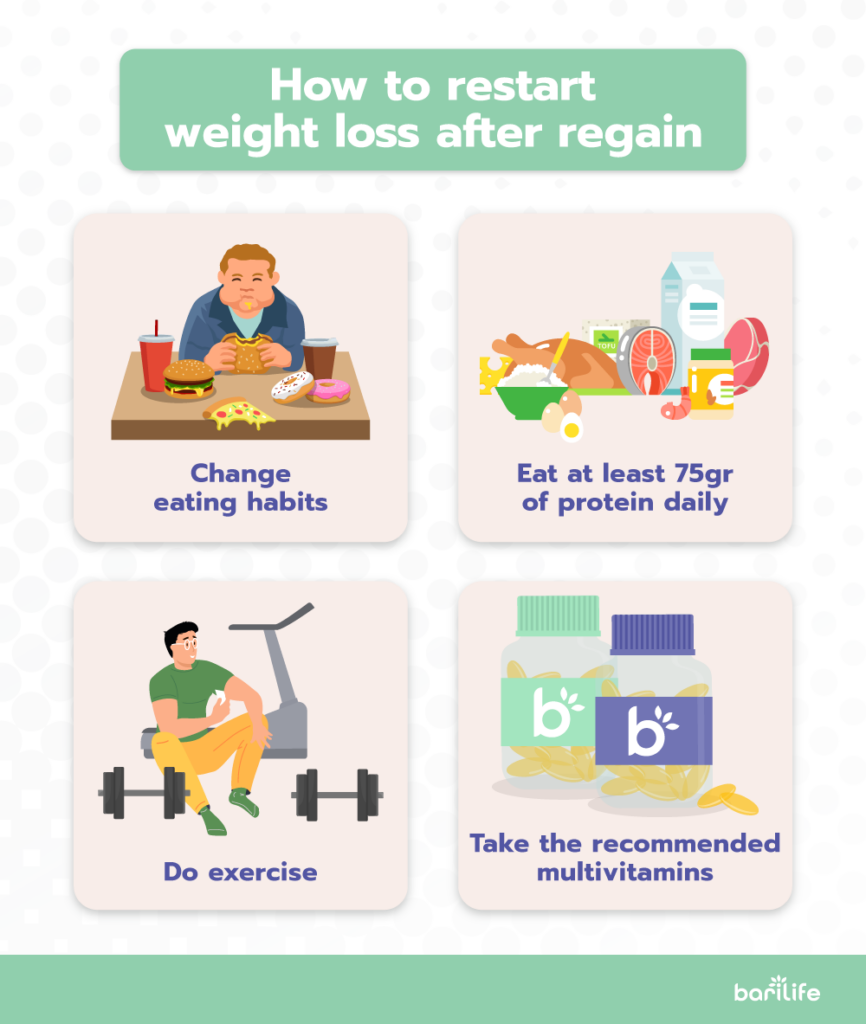
Summary
In the first few months after Roux-en-Y gastric bypass, the excess weight seems to just melt away during this “honeymoon phase.” It can almost seem effortless. It’s important to keep in mind that your lifestyle changes greatly contribute to this weight loss. You must keep up with your healthy diet and regular exercise to prevent weight regain.
If you find that you have regained some weight after gastric bypass, contact your surgeon and dietitian for help. They will recommend a diet and exercise routine to help you get back on track.




What are your tips and tricks to post-bariatric success?